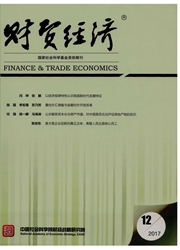

 中文摘要:
中文摘要:
本文在中共十八届五中全会提出的"创新、协调、绿色、开放、共享"五大发展理念的引领下,从战略层面分析了新时期我国扶贫开发工作存在的不足,包括体制机制上的缺失与不足带来的低效问题,不同地区、不同利益主体、不同政策之间的协调失灵,对生态环境的忽视造成扶贫成效的不可持续性,思路狭窄、理念和视野的开放性和包容性不足,城市贫困问题日益突出、收入差距呈扩大趋势,扶贫成果无法实现共享等。在此基础上,本文明确了未来深入推进扶贫工作需要坚持的新思路和新路径,即坚持创新扶贫开发机制,加强跨区域、跨主体的利益协调,坚持绿色扶贫理念,开拓扶贫思路和视野,从而实现改革成果的全民共享。
 英文摘要:
英文摘要:
Poverty alleviation is the intrinsic demand of socialism and important guarantee to achieve common prosperity,and to build a moderately prosperous society in all respects.Since the reform and opening up,the economic development of China has been growing by leaps and bounds,and the poverty problems appear a variety of new features.Therefore,poverty alleviation in the future will be faced with many new problems and new challenges,which require us to break through the conventional logics and traditional paths.Based on the Five Development Concepts of innovative development,coordinated development,green development,open development,and shared by all development,this paper analyzes the existing deficiencies of poverty alleviation work from the strategic level in our country in the new period,including the low efficiency because of the shortages of system and mechanism,the coordination failure among different regions,stakeholders and policies,the non-sustainability of poverty alleviation effect,lack of openness and inclusiveness and the disability to realize sharing reform achievements.Finally the new logics and new paths which should be insisted to deepen the poverty alleviation work in the future are proposed,including insistence on poverty alleviation mechanism innovation,strengthening coordination across regions and stakeholders,insistence on the green concept of poverty alleviation,exploiting ideas and vision for poverty alleviation and sharing the reform achievements among all the people.
 同期刊论文项目
同期刊论文项目
 同项目期刊论文
同项目期刊论文
 期刊信息
期刊信息
